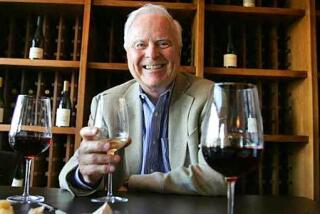A CITY IN CRISIS: HOPE AND PRAYER AMID THE ASHES : Perot Favors U.S. Charges for Officers
- Share via
WASHINGTON — Texas businessman Ross Perot said Sunday that if he were President, he would have ordered the attorney general to file federal civil rights charges against the four Los Angeles police officers accused in the Rodney King case as soon as the not guilty verdicts were announced.
A President Perot, he said, also would have gone to Los Angeles to see the situation firsthand.
“If I were home watching (the verdict come in), No. 1, I’d head for the airport, and on the way to the airport, I’d call the attorney general and tell him to file a federal case,” Perot said. “Immediately. Immediately. Because that sends people the signal that justice still lives.”
Perot, a billionaire who has said he will run for President as an independent if volunteers get him on state ballots around the country, made the comments on NBC’s “Meet the Press.”
“When I saw that (videotape of the beating), the thing that just leaped at me, No. 1, was the shock that a group of men would do that,” he said. “The second--I couldn’t believe that the other guys didn’t stop it. . . . Then you look at the end result, the verdict, which I can’t understand.”
Perot also said that television ads featuring the Willie Horton case--broadcast on behalf of George Bush during the 1988 election campaign--”certainly didn’t help” bring about racial harmony.
Horton, a black man who raped and brutalized a white woman after being released from prison under a Massachusetts furlough program, was featured in ads by an independent group that supported Bush against the then-Massachusetts governor, Michael S. Dukakis.
“I find that sort of thing reprehensible, personally, and you will never see any of that sort of thing from me,” he said. “I would like to see the campaign conducted on the issues. It’s now down to mud-wrestling.”
But, when asked about his own programs, Perot was short on specifics and, when pressed, a bit testy. Asked what he would do next if he were President, Perot said he would try to build up the family, the church and schools. He added that if investment is to be encouraged in South-Central Los Angeles, businesses will have to be given incentives.
“Real world, people with money, institutions with money, are very cautious to put it in high-risk areas,” he said.
He said he favors enterprise zones--giving tax breaks to businesses who locate in blighted urban areas.
Perot said he favors some sort of public employment for the jobless, and job-training programs. But he conceded that trying to train people for the kinds of jobs that will be available in their neighborhoods is “like wildcatting in the oil fields.
The odds that your investment in a high-risk neighborhood will fail are pretty high.”
On economic issues, Perot acknowledged that he is not certain of his earlier claims that he could save $180 billion by cutting waste in government and pare another $100 billion by denying Social Security and Medicare benefits to the rich. He conceded that some of his proposals may have been based on erroneous premises, but he pledged to come up with correct details in “a little time.”
He also sidestepped questions about his position on the so-called Brady bill, which would require a waiting period for handgun purchases, and about his stand on affirmative action, contending that to take a firm position on either would be too simple for anything but television “sound bites.”
When a reporter asked, for the sake of clarification, whether Perot opposed affirmative action, he replied: “No, no. I wish life were as simple as sound bites on television.
“I think it’s a good idea,” he added, but “I think there is a better idea behind it, and the ultimate idea is to have a society where people are so well-trained that you don’t need it--right?”
More to Read
Sign up for Essential California
The most important California stories and recommendations in your inbox every morning.
You may occasionally receive promotional content from the Los Angeles Times.










